Grants
Standing up for transgender
Busting five common myths about giving

SPRING 2023 NEWSLETTER
Up Staten
Shoring
Island
WHAT’S INSIDE
New Yorkers page 14 pages 8-9 pages 4-6
The New York Community Trust is a public charity and New York City’s largest community foundation.
We connect generous people and institutions with high-impact nonprofits making New York City, Long Island, and Westchester better places for all.
We build stronger communities, influence public policy, foster innovation, improve lives, and protect our environment.
We’d like to hear from you.
Please contact us with questions or comments: (212) 686-0010 or info@nyct-cfi.org
Congrats...
Mayor Eric Adams recently honored our funder collaborative the Mosaic Network & Fund with a citation for its dedication to providing more equitable funding for African, Latinx, Asian, Arab, and Native American arts groups in New York City. The Trust is proud to have co-founded Mosaic, which has awarded $10.4 million in grants since 2018, and we look forward to watching it thrive as it spins off into an independent entity later this year.
John Oddy, The Trust’s vice president for donor relations, was recently appointed to the advisory committee of the National Center for Family Philanthropy’s Community Foundations Family Philanthropy Network. As a committee member, he helps steer programming and practices nationwide that help families give strategically.
Recommendations from our staff
ON THE COVER:
Capitol Pressroom podcast
Recommended by Patricia Swann, program director for Thriving Communities: “It’s rare to find a resource that focuses solely on politics and developments in Albany. Capitol Pressroom is the best source I know for information on state legislation, programs, and initiatives. The host, David Lombardo, is a great interviewer.”
The Song of Trees: Stories from Nature's Great Connectors, by David George Haskell
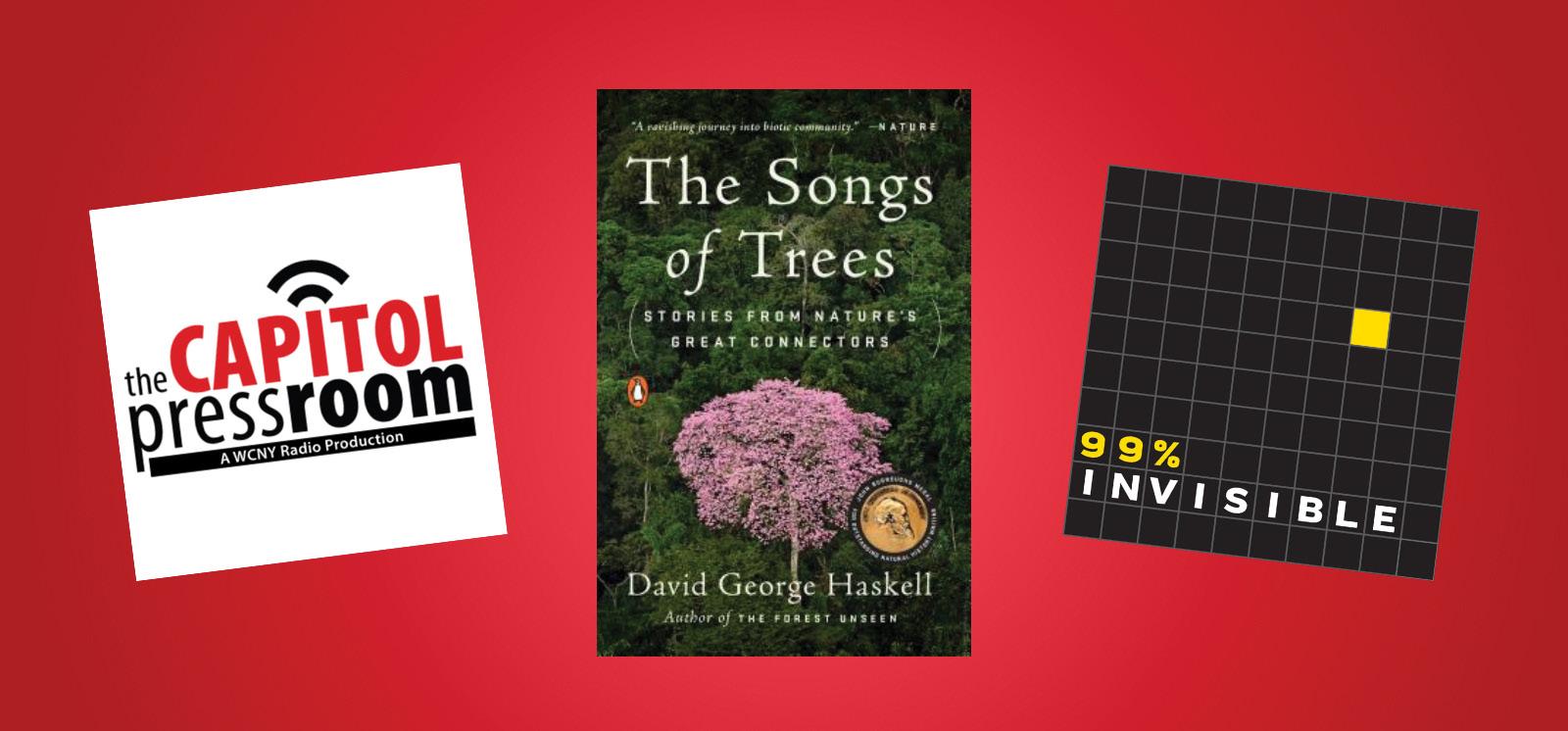
Recommended by Tara Seeley, Westchester Community Foundation senior program officer: “This profound and enchanting travelogue takes us to 12 places to introduce us to a specific tree, its role in the ecosystem, and its place in culture and history. A scientist, Haskell writes like a poet and meditates on each immediate ecosystem and the larger environmental context, giving us sharp details, lyrical phrases, and language of joy and reverence.”
Murder Most Fowl by 99% Invisible podcast
Recommended by Mar Asayan, senior digital media and graphic designer. “Our parks are a haven for migrating birds, but unfortunately, much of our surrounding architecture can pose serious risks to their safety. In this episode of 99% Invisible, host Roman Mars speaks with Trust grantee NYC Audubon about creating beautiful architecture that’s safer for birds, and what to do if you find an injured feathery New Yorker.”
WELCOME nycommunitytrust.org 2
Passengers disembark from the Staten Island Ferry at the St. George Ferry Terminal. Photo by Ari Mintz
Seeing The Trust from all angles
THE HONORABLE KRISTIN BOOTH GLEN
“Over the past 30 years, I’ve interacted with The Trust in so many ways. I’ve seen the impact of The Trust’s competitive grantmaking, and an article on donor-advised funds in one of The Trust’s recent publications completely changed the way I’m doing my admittedly modest estate planning.
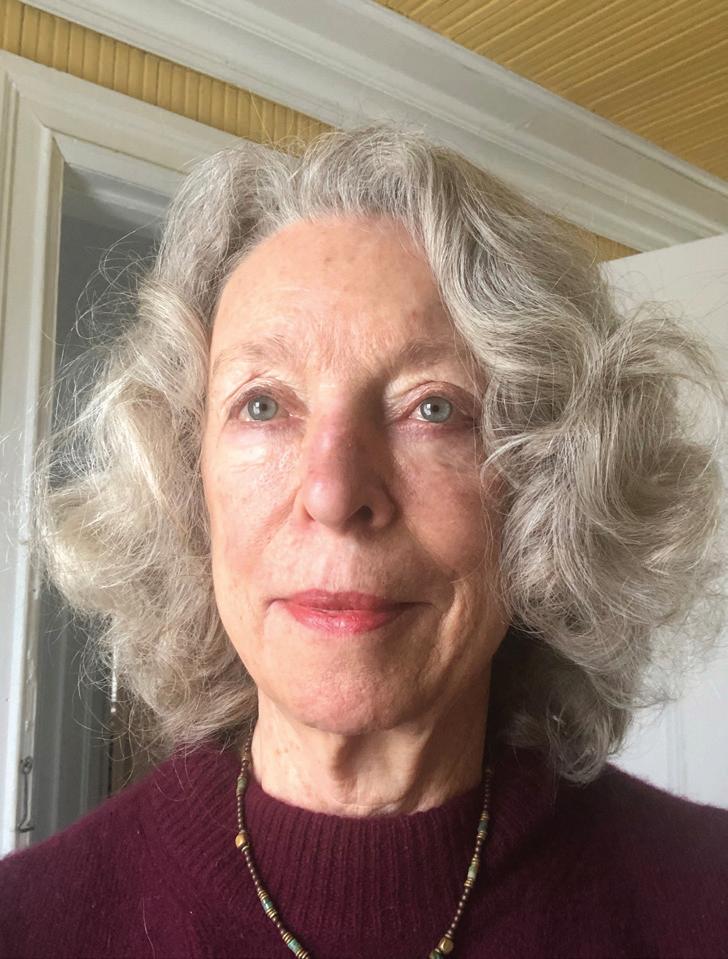
I have worked with The Trust on issues as diverse as improving legal education, increasing access to the profession for members of historically underserved communities, and improving the court system. The funding that The Trust has given to all of these causes has been impactful, catalytic, and truly transformative.
The people who work for The Trust, and especially the program officers that I’ve come to know, are extraordinarily talented, thoughtful, creative, committed, and possess enormous expertise. You could not find anyone, anywhere, better
to steward your assets—or the assets of your clients if you are a professional advisor—and to make an impact.
What I’ve recently come to understand is that what’s amazing and unique about The Trust is that it not only provides capacity for nonprofits to improve the lives of vulnerable people, but it also provides the opportunity for people with wealth to use that wealth efficiently, creatively, and quite economically to advance the charitable goals that are most important to them. And sometimes they provide solutions that you might not have thought about.
The Trust can be as valuable to a professional advisor’s clients— whether they’re individuals, small trusts, or family foundations—as The Trust has been to the New Yorkers who benefit from its grantmaking. Time and again, I’ve seen how The Trust has been able to make the world a better place.” n
Grants Newsletter | Spring 2023 3
The Hon. Kristin Booth Glen is a former judge, having served on the NYS Supreme Court, Appellate Term, First Department, and Surrogate’s Court, and was Dean of CUNY School of Law. More recently, she directed a successful, Trust-funded advocacy campaign, led by Hunter College, that resulted in legislation giving people with intellectual and developmental disabilities statewide the right to make their own decisions with the support of trusted people in their lives.
FROM THE DESK OF...
You could not find anyone, anywhere, better to steward your assets—or the assets of your clients if you are a professional advisor—and to make an impact.”
Shoring up Staten Island
Visited by the Italian explorer Giovanni da Verrazzano in 1520, named “Staaten Eylandt” by Dutch sailors aboard Henry Hudson’s ship in 1609, and “Richmond” by the British in 1664, Staten Island has a rich history and a richly textured story to tell today.
The Trust—as we do in all eight counties we serve—turns altruism into action across the Island, connecting generations of caring New Yorkers with nonprofits improving the quality of life for all.
Staten Island is a singular urban landscape with sandy beaches along its eastern shore and miles of verdant hiking trails in its central Greenbelt. It is a borough with thousands of single-family homes, several public housing developments, and communities of immigrants, including the largest population of Liberians outside of West Africa.
Over the years, The Trust co-funded several projects with

the Staten Island Foundation to help make the borough a healthy, thriving community. Laura Jean Watters, the Foundation’s executive director, said people from outside the Island often see it as a homogeneous, middle-class community, but Trust staff “look past the stereotype.”
“Receiving funding from The Trust is only part of the benefits for an organization,” Watters added. “Grantees are going to get engagement and enthusiasm from the staff and really have a thought partner. When somebody from The Trust calls, you answer. You want to be part of their work, which is far reaching and has a solid reputation.”
BETTER JOBS AND HOMES
Since good-paying jobs are the foundation of a healthy economy, The Trust has helped Island residents through the College of Staten Island’s Office of Workforce
Development and Innovation, an employment hub for jobseekers. The College is partnering with local nonprofits to find eligible scholarship candidates looking to pursue careers in growing fields such as technology, healthcare, and clean energy.
Because much of the Island’s housing stock is aging, energy inefficient, and sometimes even a threat to the health of its occupants, upgrading older homes is a win-win for residents and the environment. Neighborhood Housing Services of Staten Island works with low-income homeowners through its Healthy Homes Initiative. In addition to organizing workshops, the group offers home inspections that identify hazardous and unhealthy conditions, including triggers for asthma. Owners are then connected with vetted contractors and, if necessary, healthcare providers.
BOLSTERING ARTS AND CULTURE
For decades, The Trust has
nycommunitytrust.org 4 SPOTLIGHT An in-depth look at issues important to New Yorkers
DIVERSIFYING AUDIENCES: Donna Walker-Kuhne, a Staten Island Arts consultant, leads a workshop to help local groups expand and diversify audiences.
helped strengthen Staten Island’s important arts and culture nonprofits. Recognizing that the borough’s demographics were diversifying, The Trust supported the county’s arts council, Staten Island Arts, to create a series of workshops to prepare arts groups to better reach and serve new populations. Groups identified ways to welcome new audiences, including people with disabilities and growing immigrant communities.
The workshops were followed up with seed money to test new approaches. The Staten Island Children’s Museum, for example, created a multiracial parents advisory council and revised its marketing materials to be more welcoming. Historic Richmond Town, a living-history village and museum, searched its archives for objects that told the story of African Americans and reconfigured its arts education curriculum to be more inclusive.
“This program allowed us to build a cohort and build community,” said Gena Mimozo, deputy director and grants administrator of Staten Island Arts. “We were able to support folks in
the trenches doing really difficult work around social justice issues— and that fight continues today.”
The program was an eyeopening experience for staff and audiences at many of the predominantly white arts institutions, Mimozo said. “There was a lot of learning about other cultures, other communities, as well as learning about our own identities and positions in the world.”
A GREEN URBAN ENVIRONMENT
While the Island’s population boomed after the 1964 opening of the Verrazzano Bridge—the world’s longest suspension bridge at that time—the borough retains reminders of its rural past, and The Trust has helped cultivate its natural green spaces.
In 1948, the first scowload of garbage arrived on the Island’s western shore for burial at the Fresh Kills saltwater wetlands. The infamous Fresh Kills Landfill became the sole repository for the city’s daily 29,000 tons of garbage, finally closing in 2001. The city then announced plans to turn what Islanders universally called “the dump” into a park with both passive and active recreation areas.
The Freshkills Park Alliance used a Trust grant to create a plan to guide development and build an audience for the park as it opens in phases and undergoes 30 years of remediation.
The Trust also worked with the Greenbelt Conservancy, which manages 2,800 acres of interconnected public and private green areas in the middle of the Island. The Greenbelt is an amalgam of city-owned parks and privately owned green spaces, including a Boy Scout camp, a golf course, and a cemetery. The Trust helped the Greenbelt staff grow and assess native plants for potential use in remediating “brownfields,” former industrial sites where chemicals had contaminated the soil. The plants were tested to see if they could survive year after year as they naturally drew contaminants out of the ground.
A QUICK RESPONSE TO SANDY
The Island’s eastern residential communities, which were built on former saltwater marshes, were devastated by Superstorm Sandy flooding.
The Trust immediately supported emergency relief efforts that provided healthcare and food via Community Health Action of Staten Island and Project Hospitality
To prepare for the next storm, The Trust helped Nonprofit Staten Island bring together local agencies to create the borough’s first federally recognized disaster response network and address any gaps in preparedness.
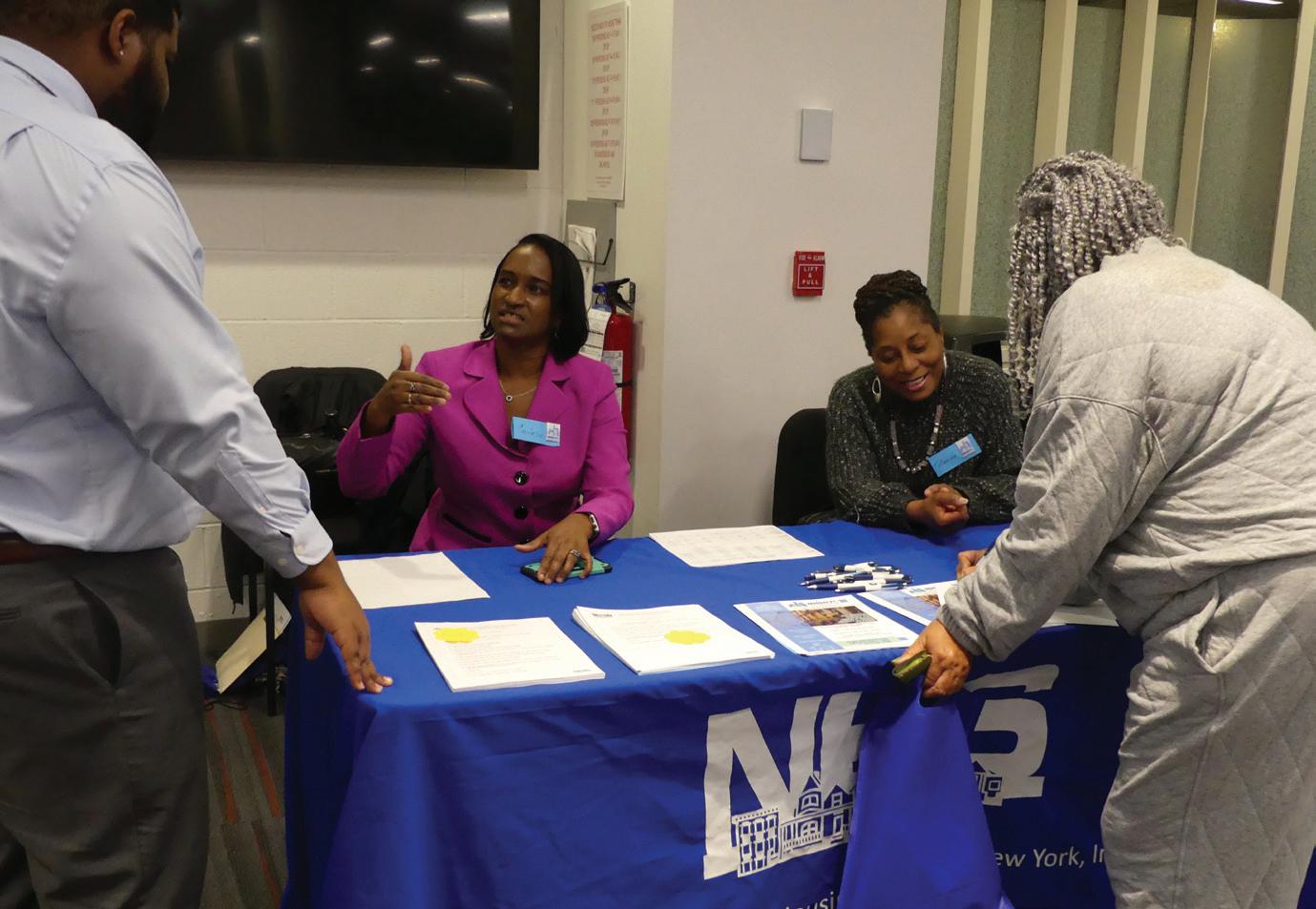
SHARING A DIVERSE HISTORY
The borough is home to one of the the country’s oldest continuously inhabited free Black communities: the Sandy Ground section in Rossville. The Trust has helped preserve that history and advance a promising partnership to digitize the genealogical records of African
(Continued on next page)
Grants Newsletter | Spring 2023 5
HEALTHY HOMES: Staff from the Neighborhood Housing Services of Staten Island talk with residents about making their homes healthier and more energy efficient.
SPOTLIGHT
An in-depth look at The Trust's grantmaking on Staten Island
communities. For example, African Refuge started “Letting Go and Letting Youth Lead” to provide training on organizing, basebuilding, writing, speaking publicly and with the media, and health disparities, as well as academic and healthcare support for Black youth on Staten Island.
Americans on Staten Island. The Richard B. Dickenson Chapter of the Afro-American Historical and Genealogical Society, the Staten Island Museum, and Frederick Douglass Memorial Park created a publicly available digital archive. The groups held “transcribe-athons,” where volunteers read handwritten pages and entered them into the growing digital records. There have been 10,000 visitors to the Staten Island Museum’s online archive and 900 to the Frederick Douglass Memorial Park site.
The Trust also helped the Island bring LGBTQ history out of the closet. A grant to the Alice Austen House came at a “really pivotal moment,” said the museum’s executive director, Victoria Munro. The north shore former home of the photographer Alice Austen had just amended its national landmark status to include its significance in LGBTQ history.
The House embarked on a reframing of its programming and marketing to more fully tell the central story of the lesbian relationship between Austen and her longtime partner, Gertrude Tate.
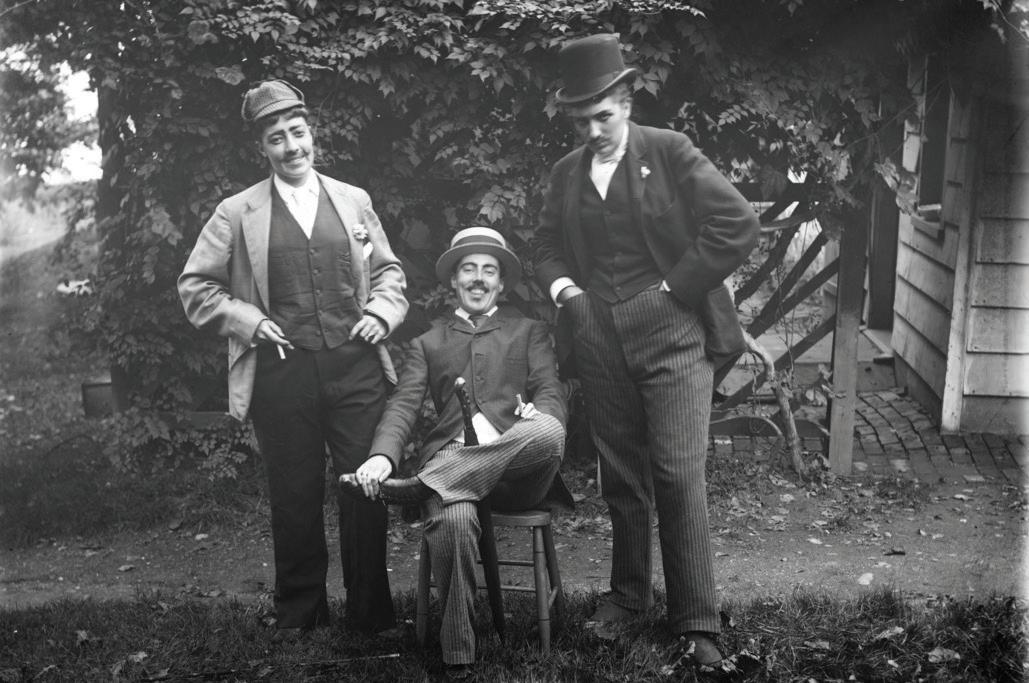
“We went from being a historic house to being at the forefront of LGBTQ interpretation at historic sites,” Munro said, adding that
the grant “enabled us to make partnerships that have been really lasting” with LGBTQ groups and institutions on the Island and citywide.
“The grant was all about visibility and that’s something we really achieved,” said Munro.
BUILDING THE NEXT GENERATION OF LEADERS
The Trust has played a role in nurturing tomorrow’s leaders from across the Island’s diverse
Emmah Sackie, a tenth-grade African Refuge participant, said, “I have found my voice. I’ve learned to stand up for what I believe and debate with a lot of information and evidence. When I am vocal I feel confident that it's going to make a difference. The world needs my voice because what I have to say does matter. Even though the world may discriminate against African American women, it won’t stop me from reaching my goals.”
YESTERDAY, TODAY, AND TOMORROW
More than twice the size of Manhattan, Staten Island is an integral part of the city’s history and an invaluable part of today’s metropolitan region. The Trust’s past and present donors have supported the Island’s nonprofits as they deliver assistance to those who need it the most. n
FOUR WAYS YOU CAN BRING A BRIGHTER FUTURE TO STATEN ISLAND:
• Be an influencer! Share this story with friends and family and talk about it.
• Donate directly or through your donoradvised fund to any of the nonprofits found in this story, or others like them.
• Give to our Community Needs Fund and we'll find charities to meet the needs of the moment on Staten Island and in the rest of the city.
• Leave a legacy by establishing a permanent fund. Contact giving@nyct-cfi.org.
nycommunitytrust.org 6
WELL-SUITED: “Dressed as Men,” 1891. Alice Austen, Julia Martin, and Julia Bredt are pictured outside Austen’s home.
Photo by Alice Austen. Collection of Historic Richmond Town
Delivering better work conditions
ANTONIO SOLIS
Delivery person Antonio Solis is a leader with Los Deliveristas Unidos, an advocacy campaign organized by the Workers Justice Project to improve the wages and treatment of app-based delivery workers. While The Trust-supported effort successfully persuaded the city to increase wages and conditions for workers, there is more to do and the campaign continues.
“Icame here because the reality is that back in Mexico, there are not many opportunities for me and my family. As many others have said, I came here searching for a better life.
I'm from Veracruz. I have a daughter who is 17 and just started college. I want to make sure she gets a career and has better opportunities and that's why, day by day, I'm here for her.
I've been in this country for four years now. I work long hours and sometimes work seven days a week. Since rent is expensive, I live with 15 other people in Queens.

I started making deliveries through restaurants directly until the pandemic hit, and many restaurants shut down. That's how I moved into doing delivery through the app. I love my job, but what I love more is working with my colleagues to keep building and supporting each other.
We started Los Deliveristas to address the safety issues that we experienced in the streets, but through
time, we have been learning how the apps are stealing our tips and making us travel long distances for little money. We saw app owners are becoming billionaires while we're taking all these risks.
My experience has been that the people I deliver to are kind and generous. I think some may know that the apps are stealing our tips, and they tip me in cash instead, which means a lot, even if it's like one dollar.
Many people think that this job is easy, but they don't understand all the risks that we have to take. I have had accidents. I have been attacked several times by people trying to rob me.
Part of this job is harsh because of the weather conditions. We deal with snow and rain, which makes it harder, but that's why we're fighting to win improvements.
Joining with Los Deliveristas was great because you're doing this with other workers. Doing this together you know that you're not alone.” n
Grants Newsletter | Spring 2023 7 FIRST PERSON
WHEEL LIFE: Antonio Solis making app-based deliveries on the streets of Brooklyn. Photo by Ari Mintz
Standing up for transgender New Yorkers
With a nationwide surge in proposed legislation threatening the rights of transgender people, and a rise in hate crimes and rhetoric aimed at this group, the struggle for equitable civil rights protections for transgender and nonbinary Americans has never felt more urgent. (The term “nonbinary” refers to a gender identity that falls outside the categories of man or woman.) Threats to personal safety have also increased, with transgender people of color and trans women experiencing the highest rates of violence.
In 2019, New York State passed the Gender Expression Nondiscrimination Act (GENDA), which made gender identity and expression protected categories. While this provided important safeguards, much work remains to achieve equity and safety for transgender and nonbinary New Yorkers. Several Trust-supported nonprofits are leading the way

in providing advocacy and services.
EDUCATION IS KEY
A leader in the campaign to pass GENDA, with support from the Long Island Community Foundation, was Gender Equality New York. Its executive director, Juli Grey-Owens, founded the group in 2015, after the Empire State Pride Agenda closed, to protect the rights of transgender, nonbinary, and intersex people by creating public understanding, influencing social attitudes, and advocating for inclusive policies.
“One of the things that we learned in our early advocacy work was that just being a regional organization did not make enough change,” said Grey-Owens. “It was clear that to get anything passed, we were going to have to do it on a state level.”
The group is advocating for legislation that would

nycommunitytrust.org 8
FEATURE STORY
TRANS TRAINING: Juli Grey-Owens, founder and executive director of Gender Equality New York, leads a training at the Suffolk Police Academy.
require prisons and jails to place incarcerated people in housing that is consistent with their gender identities and ensure that their gender identities are respected in all contexts.
Gender Equality New York conducts community town halls and trainings throughout the state, as well as trainings for healthcare professionals at Northwell Health facilities and recruits at the Nassau and Suffolk County police academies.
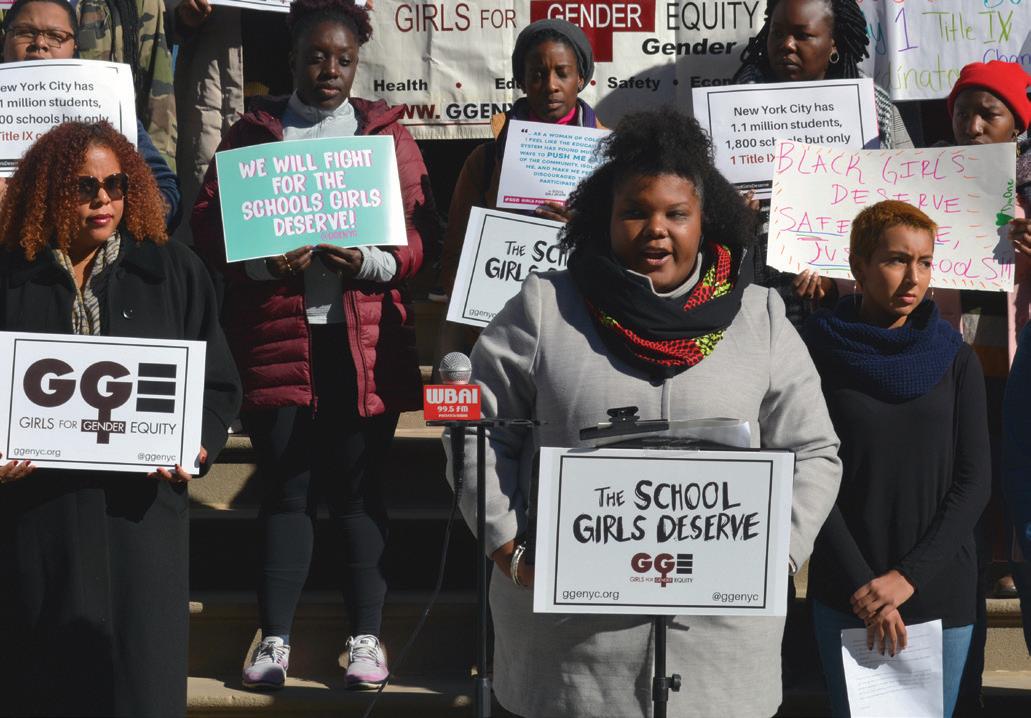
“We talk about self-identification and how everyone has the right to define their own gender and sexual orientation,” said Grey-Owens. “The main point of this is that we ask people how they identify before we drop a label on them that we think might fit.”
The trainings also address evolving language. “The words are actually changing, and when we use the term ‘transgender,’ it’s becoming more and more binary— 'I’m a trans woman, you’re a trans man, someone is transmasculine or transfeminine.’ And so we’ve really started using the term ‘gender-expansive’ to try to use terminology that is wider and more flexible, that allows for nonbinary people, some intersex people, as well as trans people,” Grey-Owens said.
“The biggest and most important part of this is talking about the fact that being gender-expansive is not a choice or a lifestyle,” said Grey-Owens. “We’re trying to get people to understand that this is not a whim. This isn’t something like, ‘Oh, I think I’ll be transgender today.’”
TRAINING YOUNG ADVOCATES
Young people are particularly vulnerable in today’s hostile climate. A recent study by the Trevor Project found that 86 percent of transgender and nonbinary youth reported that current debates around anti-trans bills had negatively impacted their mental health. Forty-five percent of these young people experienced cyberbullying, and nearly one in three did not feel safe seeking medical care when they were sick or injured.
Girls for Gender Equity champions Black girls and gender-expansive young people of color in New York City, helping make their voices heard on issues ranging from gender-based disparities in school discipline to the need for better sex education. The organization is currently using a Trust grant to provide cisgender and transgender young women and gender-expansive young people of color with training in public speaking and using personal stories to help shape public narratives. The group also is developing workshops to provide strategies for addressing discrimination and harassment.
WORKPLACES THAT ARE WELCOMING
A Trust grant helped the Division of Gender, Sexuality, and Health at Columbia University’s Vagelos College of Physicians and Surgeons conduct a study on the workplace experiences of transgender and nonbinary New Yorkers. Results showed that 80 percent reported unwelcoming and discriminatory workplaces. The Trust then supported the Division’s efforts to help employers build welcoming and productive work environments for transgender employees.
In addition to inequities in employment opportunities, gender-expansive people face numerous barriers to accessing quality medical care. With a recent Trust grant, New Pride Agenda is conducting outreach to provide resources to at-risk transgender women, helping them benefit from preventive HIV/ AIDS medication.
At its best, New York is a place where all people feel safe and free to be themselves. Thanks to donors who continue to leave legacy gifts in support of transgender people, The Trust is committed to supporting nonprofits working to make our region safer and more equitable for gender-expansive New Yorkers. n

Grants Newsletter | Spring 2023 9
TAKING A STAND: Girls for Gender Equity held a rally to advocate for better conditions and resources for girls and gender-expansive young people in New York City schools.
HEALTH AMBASSADOR: New Pride Agenda Program Coordinator Jocelyn Bula (left) with participant D’Anne Streets at the graduation ceremony for an HIV prevention and education program supported by The Trust.
Magnifying our impact through collaborations
The late, great soccer star Pelé once said, “No individual can win a game by himself.”
That understanding of the power of joint action has led the Long Island Community Foundation to organize several donor collaborative funds to tackle today’s toughest challenges.
Collaborative funds bring together donors who pool their financial resources and expertise so the whole of their efforts is greater than the sum of their parts. Collaborative funds allow donors to share knowledge, build relationships, and learn from one another, leading to more informed and effective grantmaking decisions. Here are updates on four of our many collaborative funds on Long Island.
The Long Island Sound Funders
Collaborative is a group of 18 foundations, corporations, and individual donors from New York and Connecticut that support efforts to protect and preserve the Sound’s ecosystem.
The Collaborative recently made grants to eight nonprofits, including Save the Sound, which will remove barriers, such as dams, that interrupt the flow of rivers in the Sound’s watershed and impact the health of the habitat and wildlife. Save the Sound will partner with several nonprofits to study and accelerate the removal of these barriers.
The Long Island Immigrant Children’s Fund was created in 2014 by the Long Island Community Foundation and seven other foundations to provide critical assistance to the growing community of immigrants, specifically children, many of whom are fleeing the threat of physical violence in their homelands.
Between 2014 and 2019, Long Island received more than 15,500 immigrant children, mostly from Central America, nearly 44 percent of the New York State total. The Fund provides support

nycommunitytrust.org 10
LONG ISLAND
CLEANING OUR WATER: A young volunteer removes debris from Long Island Sound.
to the thousands of immigrant children who have come to Long Island, including unaccompanied immigrant children who were placed with sponsor families.
The Fund supports local nonprofits, such as the Health and Welfare Council of Long Island, that provide critically needed legal services, healthcare, education, and other services to these children, who often face significant challenges due to language barriers, trauma, and other factors.
The Long Island Racial Equity Donor Collaborative works with 14 donors to address the income and wealth gap for Black Long Islanders. The fund was created in 2018 after research confirmed a $24 billion racial income gap on Long Island. The Collaborative supports programs that provide affordable housing, job training, financial education, access to capital, and job training for communities of color.
Among its recent grantees is WDN Resource Center, or the Women’s Diversity Network, which is developing a career mentorship program that pairs candidates with industry professionals who can advise them on getting promotions, securing higher-paying jobs, or changing careers. The candidates benefit from professional development and learn about other industries.
“Through exposure and sponsorship in industries that are hiring and paying more equitable wages, this fellowship will address the wage gap inequality that Black women and Black gender-expansive people face,” said Shanequa Levin, CEO and founder of WDN.
The Collaborative also has supported Choice for All in establishing and maintaining centers to improve the credit and financial health of Black Long Islanders.
The All For The East End Fund has been addressing hunger and food insecurity since 2013.

“While often invisible to some
East End residents and vacationers, hunger is an unfortunate reality for many in our community,” said David Okorn, executive director of the Long Island Community Foundation.
During the pandemic, the Fund launched a widespread “Feed the Need” fundraising campaign that received donations from local businesses, government leaders, and concerned community members. Among the many community-based efforts that benefited was a “farm-to-food pantry” initiative that sent organic produce from Quail Hill Farm in Amagansett–run by the nonprofit Peconic Land Trust–to the Bridgehampton Child Care & Recreation Center food pantry.
“The need is great,” said Bonnie Michelle Cannon, executive director of Bridgehampton Child Care. “And the heart of this community is rising to the occasion.”

In recent years, the fund also has supported pantries in Montauk, East Hampton, Wainscott, and Hampton Bays. n
Expert partners
To learn more about The Trust’s 40-year history of working with funder collaboratives, check out this recent article published in Local Development & Society, written by Trust VPs Kerry McCarthy and Shawn Morehead.
Grants Newsletter | Spring 2023 11
FOOD FOR THOUGHT: Marta Blanco, a bilingual nutritionist from Cornell Cooperative Extension of Suffolk County, provides healthy eating tips at a food pantry, made possible by a grant from the All For The East End Fund.
Working to protect the Saw Mill River
While many people regularly drive down the twisting Saw Mill River Parkway, few have seen the waterway after which it is named. For decades this tributary to the Hudson River was neglected, strewn with trash, and had sections covered with concrete. Today, the riverway is coming back as a result of joint community action.
For several years, our Westchester Community Foundation provided grants to Groundwork Hudson Valley to build community-based stewardship of the Saw Mill River and its watershed. In 2001, the organization created the Saw Mill River Coalition— which included municipalities, community groups, and environmental organizations—to work together

to restore and protect the river corridor. A significant early Coalition victory “daylighted” the river in Yonkers, persuading the city to remove a parking lot that had covered the river since the 1920s. The city completed daylighting at two additional sections of the river in downtown Yonkers and is currently making plans for one more.
Groundwork has been advising municipalities on an action plan to improve the health of the river and its ability to absorb stormwater after heavy storms, such as the intense flooding after Hurricane Ida. It helped Yonkers develop its stormwater management next to municipal housing sites and collaborated with the city engineer on a flood-control berm to protect the
nycommunitytrust.org 12 WESTCHESTER
riverbank and recent native-species plantings. It also advised Hastings-on-Hudson, Dobbs Ferry, and Mount Pleasant on their river action plans.

Groundwork is strengthening local stewardship groups—including emerging ones in Pleasantville and Thornwood—to advocate for the watershed and conduct invasive-plant and riverbank cleanups that have cleared away everything from fast-food wrappers to an old bathtub.
“Because restoring a river and its watershed is a long-term project, there needs to be consistent funding over the years and sustained community stewardship,” said Tara Seeley, the Foundation's senior program officer. “Groundwork has helped all of our communities work together to restore aquatic habitat and elevate the visibility of the river as an urban and suburban amenity.” n
Helping women rebuild their lives
Helping domestic violence survivors is a complicated and lengthy process. The Rehousing in Supportive Environments, or RISE, pilot program led by Caring for the Hungry and Homeless of Peekskill, My Sisters Place, and Lifting Up Westchester is using federal funds to find housing for domestic violence survivors. Westchester Community Foundation is making sure that other critical needs of these survivors are met.
“I am forever grateful to RISE for our new life,” said one mom. “I tried many times to leave in the past, but always went back because I couldn’t do it on my own. RISE gave us a safe place to heal and the finances and resources to do so. It took us a while to get adjusted, but RISE was there for us every step of the way! For the first time in a very long time, we felt safe. We were finally able to sleep peacefully at night and not worry.”
The program’s objective is to help survivors secure stable, affordable housing as a first step to long-term safety, employment, and self-sufficiency. RISE helps participants pay for childcare, transportation, school supplies, tuition, and rent arrears or other financial damage created by an abusive partner.
“Placing women, many of whom are mothers, in safe housing and then providing an array of supports can make an important difference in getting these families back to stability,” said Laura Rossi, executive director of our Westchester Community Foundation. n
Grants Newsletter | Spring 2023 13
For the first time in a very long time, we felt safe. We were finally able to sleep peacefully at night and not worry.”
A RIVER RUNS THROUGH WESTCHESTER: This section of the Saw Mill River was uncovered in Yonkers as a result of community advocacy.
Busting common myths about giving
Maggie is The Trust's assistant director of donor services and grants management. Scan the QR code for her contact information.
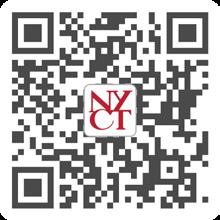
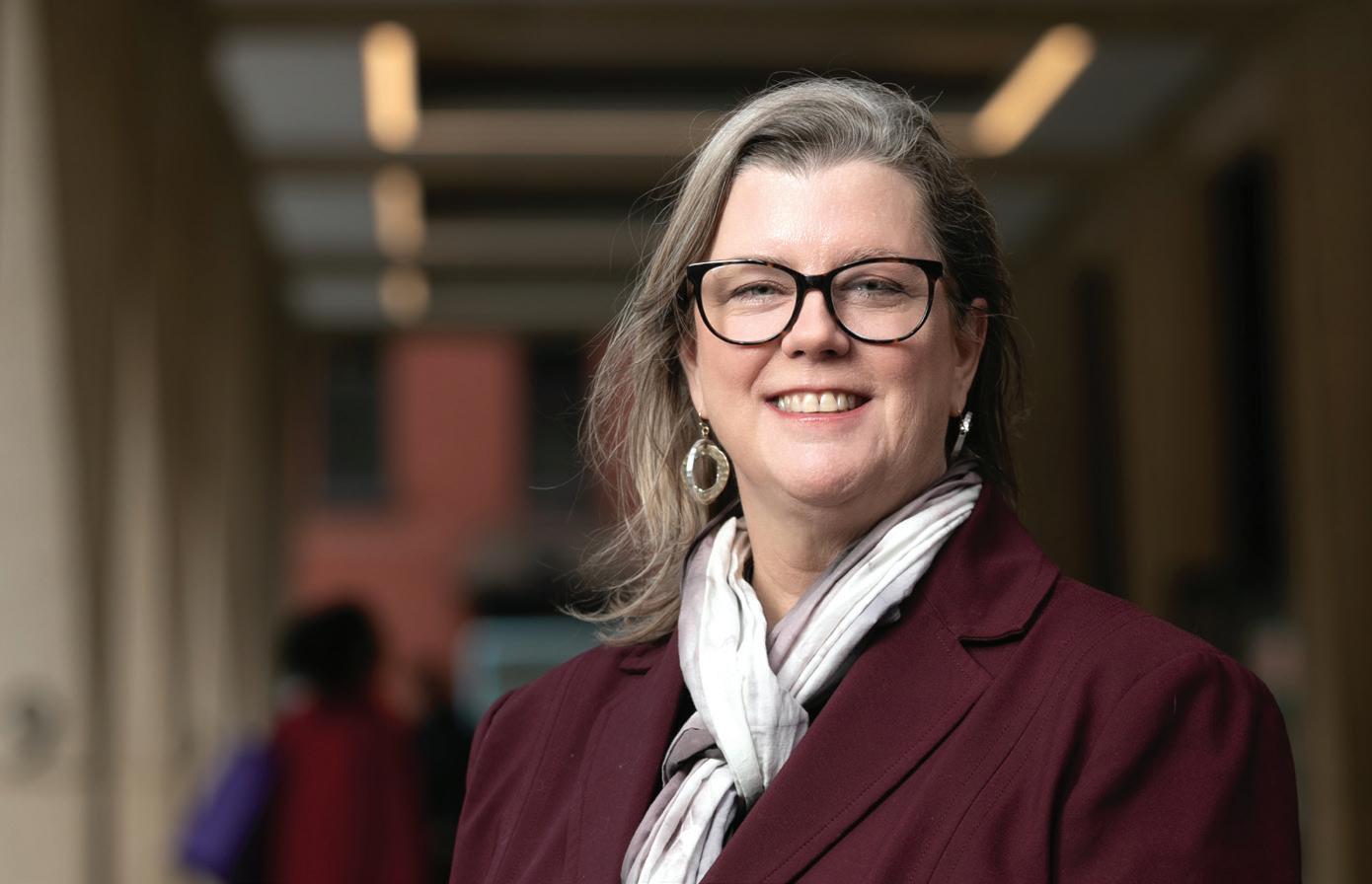
My job is to make giving easy and joyful for our donors. There are common concerns that I’ve heard from donors over the years and the list below represents a few. I love to hear from you, so please feel free to reach out.
MYTH #1 – I should wait to make my yearly gifts to nonprofits at the end of the year.
BUSTED: While many of us wait to make year-end gifts to nonprofits, consider modifying that tradition. Not only do nonprofits need the money all year round, many organizations have fiscal years ending in June, so gifts in the spring help keep budgets balanced.
MYTH #2 – I can’t support a nonprofit fundraising gala through my community foundation.
BUSTED: It’s true that the IRS does not permit you to pay any portion of the cost of attendance to a fundraiser, such as a gala or golf outing, from your community
foundation’s donor-advised fund (or DAF). This includes the taxdeductible and non-tax-deductible portions. However, you can make a gift from your DAF to the organization in lieu of tickets. You also can make an additional DAF gift in honor of its fundraiser, as long as you’ve paid the base price of the tickets.
MYTH #3 – I can’t give my Qualified Charitable Distribution (QCD) from my IRA to a community foundation.
BUSTED: While it’s true federal law does not allow you to donate your QCD to your donor-advised fund, you CAN donate it to a community foundation, like The New York Community Trust, if you give the foundation the freedom to address urgent needs it has identified. For example, you can donate your IRA distribution to our Community Needs Fund, or use it to create a field-of-interest or unrestricted fund in your name. Make a difference while minimizing your taxes.
MYTH #4 – I need to be a multimillionaire to have a charitable legacy that makes a difference.
BUSTED: The magical thing about creating an endowed fund in The New York Community Trust is the impact you are able to make over time. With our stewardship and investment, your fund can grow and give away far more in the future than you ever put into it. This means that organizations will benefit through the years, no matter the size of your fund.
MYTH #5 – I can only give locally from my donor-advised fund.
BUSTED: While our mission is to make life better in New York City, Westchester, and Long Island, our donors enjoy giving to organizations around the country from their donor-advised funds. Many use their DAF to support hometown charities, nationally focused organizations, or their alma maters. n
nycommunitytrust.org 14 YOUR PHILANTHROPY
Photo by Ari Mintz
MAGGIE MURPHY
In their own words
Young people find support from caring, trusted adults at The Door, whether they need help with a legal issue or an opportunity to explore their creativity. Youth leader Hallie Honore read an original poem at The Door’s Spring Showcase at the Bowery Poetry Club in March.
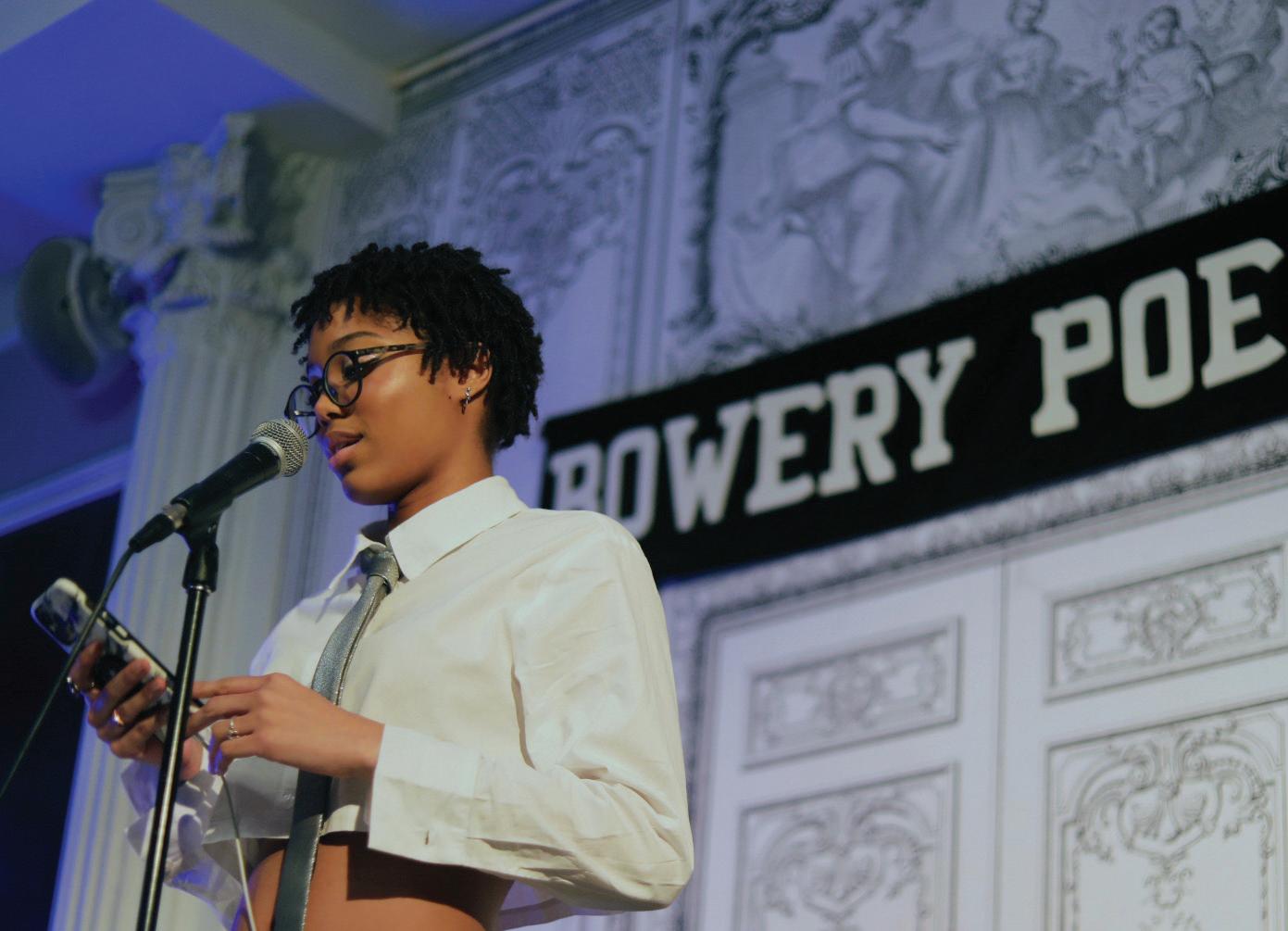
Excerpt from Coming Out of the Cocoon by Hallie Honore
They say if you put your mind to it you can do it growing up I wanted to be everything and now I have no clue with what I wanna do I can pick and choose but I’m indecisive
sometimes I want to hear someone's opinion to feel better about myself then I realize everything is up to me
…But I don’t want to fight I want to embrace then roller skate and feel like I’m being chased in the wind sometimes I feel like I don’t fit in But I am me and you are you We are equal did you watch that new sequel? she’s forever evolving…
Is The Trust in your will?
The future is unpredictable. The New York Community Trust was built for that. Through our deep expertise, sound investment, and careful oversight, we will ensure your charitable gift meets tomorrow’s challenges, just as we’ve been doing for nearly 100 years.

Financial information about The New York Community Trust can be obtained by contacting us at: 909 Third Avenue, 22nd Floor, New York, New York 10022, (212) 686-0010, at www.nycommunitytrust.org, or as stated below: Florida: SC No. CH9514 A COPY OF THE OFFICIAL REGISTRATION AND FINANCIAL INFORMATION MAY BE OBTAINED FROM THE DIVISION OF CONSUMER SERVICES BY CALLING TOLL-FREE, WITHIN THE STATE, 1-800-HELPFLA OR AT www.FloridaConsumerHelp.com REGISTRATION DOES NOT IMPLY ENDORSEMENT, APPROVAL, OR RECOMMENDATION BY THE STATE. Maryland: For the cost of postage and copying, from the Secretary of State.
Michigan: MICS No. 22265. Mississippi: The official registration and financial information of The New York Community Trust may be obtained from the Mississippi Secretary of State’s office by calling 1-888-236-6167. New Jersey: INFORMATION FILED WITH THE ATTORNEY GENERAL CONCERNING THIS CHARITABLE SOLICITATION AND THE PERCENTAGE OF CONTRIBUTIONS RECEIVED BY THE CHARITY DURING THE LAST REPORTING PERIOD THAT WERE DEDICATED TO THE CHARITABLE PURPOSE MAY BE OBTAINED FROM THE ATTORNEY GENERAL OF THE STATE OF NEW JERSEY BY CALLING (973) 504-6215 AND IS AVAILABLE ON THE INTERNET AT http://www. state.nj.us/lps/ca/charfrm/htm. New York: A copy of our most recent financial report is available from the Charities Registry on the New York State Attorney General’s website at www.charitiesnys.com or, upon request, by contacting the NYS Attorney General, Charities Bureau, at 120 Broadway, New York, NY 10271 or at 212-416-8401. North Carolina: Financial information about this organization and a copy of its license are available from the State Solicitation Licensing Branch at (888) 830-4989 (within N.C.) or (919) 814-5400 (outside N.C.). Pennsylvania: The official registration and financial information of The New York Community Trust may be obtained from the Pennsylvania Department of State by calling toll-free, within Pennsylvania, 1-800-732-0999.
Virginia: From the State Office of Consumer Affairs in the Department of Agriculture and Consumer Affairs, P.O. Box 1163, Richmond, VA 23218. Washington: From the Charities Program at 1-800-332-4483, or www.sos. wa.gov/charities. West Virginia: West Virginia residents may obtain a summary of the registration and financial documents from the Secretary of State, State Capitol, Charleston, WV 25305. Wisconsin: A financial statement of the organization disclosing assets, liabilities, fund balances, revenue and expenses for the preceding fiscal year will be provided to any person upon request.
IN
WITH APPLICABLE
IN A STATE DOES NOT IMPLY ENDORSEMENT, APPROVAL, OR RECOMMENDATION OF THE NEW YORK COMMUNITY TRUST BY THE STATE.
Grants Newsletter | Spring 2023 15 NEW YORK MINUTE
CONTRIBUTIONS
DEDUCTIBLE
INCOME
PURPOSES
ARE
FOR FEDERAL
TAX
ACCORDANCE
LAW. REGISTRATION
ONSTAGE: The Door’s Youth Arts Council member Hallie Honore performs.
Contact Marie D'Costa for a consultation: md@nyct-cfi.org or (212) 686-2461
909 Third Avenue, 22nd Floor
New York, NY 10022

nycommunitytrust.org
Address Service Requested
They shared a passion for the environment
Elise Jerard lived upstate and was an early champion of solar power. In her will, she created a fund in The Trust that would “be used to foster the environmental and humanitarian purposes to which I have devoted my time and energy for many years.” Recently, we used her fund to help implement ambitious statewide climate legislation.
Abdel Afghani was born in the desert climate of Saudi Arabia but loved the trees, flowers, shrubs, and parks in New York City. He created the Hejaz Tree Conservation Fund in The Trust to support these green spaces. We recently used his generosity to make a grant for stewardship of street trees, community gardens, and other green spaces in the Bronx.
Even when our donors care about similar causes, they find their own way to express their commitment–and we take pride in taking the time to honor their wishes.
Thank you to all those who’ve entrusted their charitable legacies to us to safeguard our environment. And happy Earth Day!
To learn more about how you can give with us, contact (212) 686-0010 x363 or giving@nyct-cfi.org.
Connect with us!
We’d like to hear from you. Please contact us with questions or comments: (212) 686-0010 or info@nyct-cfi.org

Nonprofit Org. U.S. Postage PAID Permit No. 1534 Hackensack, NJ






















